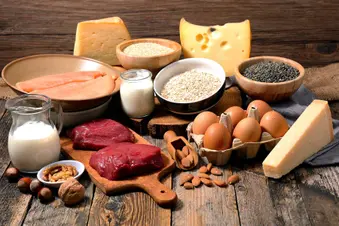
All kinds of cells in your body need vitamin B12. That includes red blood cells and glial cells, the kind that protect your nerves. But you don’t make this nutrient on your own. You have to get it from outside sources. It occurs naturally in certain foods, like meat, dairy, and eggs. It’s also added to some foods.
On average, most people 14 and older need about 2.4 micrograms a day. The good news is your body stores extra B12 in your liver. If you stop absorbing it, it’ll take a few years to use what’s left. But once you do, you’ll likely have some health problems. These include fatigue, memory trouble, or nerve damage.
Treatment can help you get better. If you have a serious deficiency, your doctor will probably give you B12 through a shot in your muscle or a daily high-dose supplement. You may need to make changes to your diet, too. Boost your B12 levels with these foods.
Fish and Shellfish
This is how much B12 you’ll find in a 3-ounce serving of these foods:
- Cooked clams: 84.1 micrograms
- Steamed mussels: 20.4 micrograms
- Cooked Atlantic mackerel: 16.1 micrograms
- Steamed Alaska king crab: 9.8 micrograms
- Cooked wild rainbow trout 5.4 micrograms
- Cooked salmon: 2.4 micrograms
Red Meat
This includes beef and lamb. Like humans, large amounts of B12 are stored in their livers.
Here’s what you can get from 3-ounce servings of the following:
- Cooked beef liver: 70.7 micrograms
- Grilled lean beef, steak: 6.9 micrograms
Too much red meat can raise your chances for certain health conditions. That includes heart and blood vessel problems and certain kinds of cancer. You may want to limit it to a few servings a week. Ask your doctor how much is safe for you.
Dairy
Cows also pass B12 into their milk. This is what you’ll find in the following:
- Low-fat milk, 1 cup: 1.2 micrograms
- Low-fat yogurt, 8 ounces: 1.2 micrograms
- Swiss cheese, 1 ounces: 0.9 micrograms
Poultry
You can find some B12 in chicken and turkey.
- Cooked turkey liver, 3 ounces: 23.9 micrograms
- Cooked chicken liver, 1 ounces: 4.7 micrograms
- Cooked ground lean turkey, 3 ounces: 1.6 micrograms
- Roasted turkey, 3 ounces: 0.8 micrograms
- Roasted chicken breast, 3 ounces: 0.3 micrograms
Eggs
One hard-boiled egg has about 0.6 micrograms of B12. That’s 25% of your daily value. But you’ll need to eat the whole egg. Most of the B12 comes from the yolk.
If you have a deficiency, eggs shouldn’t be your main source of B12. There’s not a lot of evidence that they can raise your levels of B12 all that much.
Vegan or Vegetarian Sources
It’s harder to get your B12 from food if you’re on a strict plant-based diet. That means you don’t eat any animal products, including eggs or dairy. Your doctor will likely suggest taking a daily or weekly dietary supplement to keep your levels up. They can let you know what dose is right for you.
You can get B12 from some plant-based sources. These include fortified foods with added nutrients.
- Fortified non-dairy milks, such as soy or oat, 1 cup: 0.6-2.07 micrograms
- Fortified cereals, one serving: 0.6-2.1 micrograms
- Nutritional yeast, 1 tablespoon: 4.8 micrograms
Always read the nutrition label to see how much B12 you’re getting per serving.
Some fermented foods and seaweed have B12. It comes from their exposure to bacteria. You shouldn’t depend on them for all your B12 needs. But you can still add them to your diet. They include:
Tempeh. This is a fermented soybean cake. Studies show that one serving may have anywhere from 0.7-8.0 micrograms. But it’s hard to know exactly how much you’ll get in the kind you find at the grocery store.
Nori. These are dried sheets of seaweed. You’ve probably seen them used to make sushi. Studies show it might be possible to get 2.4 micrograms of B12 from 4 grams of nori. But you’d need to eat a little more than 13 sheets to meet your daily intake.
If you’ve been vegan or a strict vegetarian for more than a few years, ask your doctor to check your B12. A simple blood test can show if your levels are where they should be.
When Food Isn’t Enough
Treatment for your B12 deficiency depends on what’s causing it. Older age and certain health conditions, like pernicious anemia, can make it hard for your stomach to absorb B12 from food. Your doctor can run some tests to find out if you have these problems. You may need regular B12 shots or dietary supplements to stay healthy.
Show Sources
SOURCES:
Office of Dietary Supplements (NIH): “Vitamin B12.”
Merck Manual: “Vitamin B12 Deficiency.”
Experimental Biology and Medicine: “Vitamin B12 sources and microbial interaction.”
Oregon State University: “Vitamin B12.”
JAMA Internal Medicine: “Association of Processed Meat, Unprocessed Red Meat, Poultry, or Fish Intake with incident Cardiovascular Disease and All-Cause Mortality.”
Would Cancer Research Fund: “Limit red and processed meat.”
Nutrients: “Dietary Sources of Vitamin B-12 and Their Association with Vitamin B-12 Status Markers in Healthy Older Adults in the B-PROOF Study,” “Vegan Nutrition for Mothers and Children: Practical Tools for Healthcare Providers,” “Vitamin B12-containing Plant Food Sources for Vegetarians.”
FoodData Central (USDA): “Turkey, all classes, liver, cooked, simmered,” “Chicken liver, braised,” “The Original Oat-Milk,” “Soy milk.”
National Nutrient Database (USDA): “Nutrients: Vitamin B12.”
Harvard Health Publishing: “Should you take a vitamin B12 supplement.”